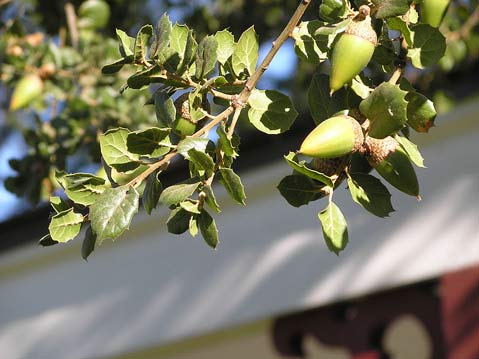Sounds of Fall
Soft Rain, Cricket Mating Music, and the Falling of Acorns

That recent little rain shower was a lovely surprise, and the sound of the water pattering on the roof, sluicing down the rain gutter (and the smell of damp leaves) was delightful. Fall announces itself with other sounds that are also unique to the season and as equally wonderful to take note of.
One that resounds of “fall” is the falling of the acorns from California live oaks. They may fall all day long, even all night long, but it seems like the late afternoon is when the dropping of acorns begins to sound like a regular rain shower. Plink, plunk, and even kapow; the acorns plummet to the earth below. If they fall in the oak leaf duff, they almost always just disappear beneath the mulch. If they happen to land on a hard surface like a concrete patio, they rebound with a seemingly unnatural vigor. A golf ball wouldn’t bounce much higher than these little missiles of oak DNA. Let them encounter a metal patio chair or table and the chime is loudly melodic. Perhaps Mother Nature is ringing her temple bell; the sound is a prayer to the season.
Of course this bounty is also a signal to several birds and rodents to gather their winter stores. The competition can be fierce sometimes. Squirrels chitter away at the scrub jays; acorn woodpeckers swoop down to snatch up their favorite food. These are the major beneficiaries of this bounty, and they have various ways of stashing acorns away for another day. While they benefit from the nutrient rich storehouse that the fatty acorns provide, they unwittingly aid in the dispersal of the next generation of oak trees. Not all of the seeds that they stash will be remembered and retrieved. Those that aren’t may survive to germinate and grow into another stately tree.
The mating sounds of the cricket are also specific to this late summer warm weather. Only the male is capable (or at least motivated to do so) of rubbing his toothed wings together. He does so to attract a mate. His rhythmic serenade lures a female of his species to his location. Once the deed is done, she will lay eggs that remain dormant through the winter to hatch when spring arrives again. In some years, when populations are high, the sound can be almost deafening. Of late, the cricket populations have been greatly reduced in many areas. Apparently, a virus has arrived among them. What will be the consequence of this reduction in the number of crickets? It’s hard to predict, but since they are among some of the major recyclers of organic material, both vegetable as well as animal, there could be at least a temporary glitch in this cycle.
The lone cricket that is faithfully serenading outside my window seems to have escaped that fate; let’s hope there is a female somewhere within hearing. Until the soothing sounds of winter’s rain provide nature’s melody, enjoy the magical sounds of autumn.



